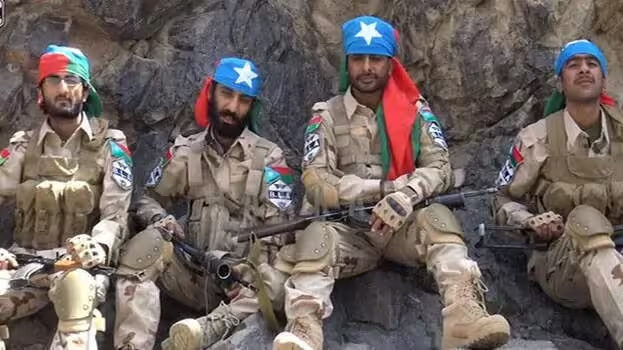
Pakistan’s Balochistan province has witnessed a surge in militant activity, with the Baloch Liberation Army (BLA) claiming responsibility for 71 coordinated attacks at 51 locations. The attacks targeted police stations, infrastructure along major highways, and Pakistani military and intelligence facilities. The BLA has issued a strong statement, warning India and the international community against Pakistan’s alleged duplicity in peace negotiations.
BLA’s Message to India
In its latest statement, the BLA criticized Pakistan’s diplomatic overtures, calling them a “deception, a war tactic, and a temporary ruse”. The group urged India to recognize Pakistan’s role in fostering global terrorism and take decisive action.
The BLA is “neither a pawn nor a silent spectator,” according to spokeswoman Jeeyand Baloch, but rather a “dynamic and decisive party” that is influencing the future of the region. The statement signals a potential geopolitical shift, with the BLA advocating for a new order in South Asia.
The Scope of the Attacks
The BLA’s offensive, dubbed Operation Herof, involved ambushes, IED blasts, sniper fire, and targeted killings of Pakistani troops. Key strikes were carried out in Kech, Panjgur, Mastung, Quetta, Zamuran, Tolangi, Kuluki, and Nushki.
The group also targeted vehicles transporting minerals, highlighting its opposition to Pakistan’s resource extraction policies in Balochistan.
Pakistan’s Response
Operation Herof, the BLA’s onslaught, included targeted executions of Pakistani forces, sniper fire, IED explosions, and ambushes. Kech, Panjgur, Mastung, Quetta, Zamuran, Tolangi, Kuluki, and Nushki were the sites of significant strikes.
The Pakistani government has long accused the BLA of being a foreign-backed proxy, a claim the group vehemently denies. The BLA maintains that its struggle is independent and rooted in the fight for Balochistan’s self-determination.
Geopolitical Implications
The BLA’s direct appeal to India raises questions about New Delhi’s stance on the Baloch insurgency. While India has historically maintained a cautious approach, the group’s latest statement could prompt discussions on regional security and counterterrorism strategies.
Additionally, the BLA’s accusations against Pakistan’s Inter-Services Intelligence (ISI), alleging its role in fostering terrorist groups like Lashkar-e-Taiba and Jaish-e-Mohammad, may influence international diplomatic responses.
Conclusion – Baloch Liberation Army
The BLA’s latest offensive underscores the volatile security landscape in South Asia. As Pakistan grapples with internal unrest, India and the global community face critical decisions regarding their engagement with the Baloch insurgency.
Will this escalation lead to a regional shift in alliances and security policies? Only time will tell.